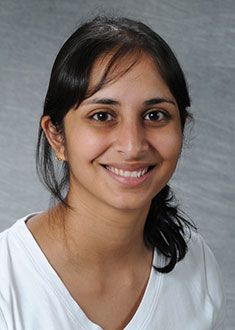
For most people it’s not uncommon, after a busy week or a long day of strenuous work or exercise, to fall asleep a little earlier than usual. It’s often a one-time thing and following a good night of sleep they return to their normal routine. For a small segment of the population, however, it’s a life-long problem. They regularly drift off early in the evening only to find themselves wide-awake in the wee hours of the morning unable to fall back to sleep. It’s called Familial Advanced Sleep Phase Syndrome (FASPS), an inherited condition where one’s internal clock is perpetually out of sync, leaving bleary-eyed sufferers in a constant state of unrest. For Geetha Bhagavatula, a second-year medical student at the George Washington University School of Medicine and Health Sciences (SMHS), FASPS presented an extraordinary opportunity to delve into a rare disorder during a summer medical fellowship opportunity she earned through the Howard Hughes Medical Institute (HHMI).
Bhagavatula spent this summer working in a neurology lab, exploring the causes of FASPS. Her days were spent searching for the specific genetic mutations responsible for FASPS and determining how that mutation alters people’s sleeping patterns. “Even though FASPS is a rare disease, more in-depth research is important because it could greatly benefit individuals who suffer from other types of sleep problems,” says Bhagavatula.
Bhagavatula applied for the Summer Medical Fellows Program thanks to her brother, Sharath, a rising fourth-year medical student at New York University School of Medicine, who recently completed a year-long HHMI Medical Research Fellowship. “My brother encouraged me to apply for this fellowship,” explains Bhagavatula. “He said it would be a great experience for me and give me a chance to learn from people doing some of the most exciting research in the medical field.”
Through her fellowship, Bhagavatula gained priceless hands-on experience investigating a fascinating disorder as a member of a team leading biomedical researchers. “The people I worked with this summer are some of the most creative and dedicated people in the field,” she says.
“I took neurology in medical school,” adds Bhagavatula, but that’s no substitute for that first-hand access to “the things they are currently discovering in this lab.”
This is the inaugural year of HHMI’s Summer Medical Fellows Program, which provides opportunities for medical, dental, and veterinary students to conduct 8-10 weeks of research in HHMI laboratories. Bhagavatula is one of just 27 students who received a summer medical fellowship. Nineteen of those students will conduct their research at an institution other than their home school, including Bhagavatula, who will carry out her fellowship at the University of California, San Francisco.
Awardees tackle basic, translational, or applied biomedical research project for the summer, and refine their research skills and enhance their scientific knowledge. “The Summer Medical Fellows Program,” says Melanie Daub, program officer for the HHMI Medical Research Fellows Program, “encourages more medical, dental, and veterinary students to engage in rigorous research training in the laboratories of HHMI investigators or researchers at HHMI’s Janelia Farm Research Campus in Ashburn, Va., and to subsequently apply for a year of full-time research in our Medical Research Fellows Program.”
Ultimately, the fellowship program helps students like Bhagavatula gain a rich research experience during the summer. “By enabling these students to participate in intense research training during their medical education, we hope they will be motivated to pursue research-oriented residency programs and careers as physician-scientists or medically-trained researchers,” says Daub.
For Bhagavatula, the opportunity to sample such a lively research experience and explore the genetic roots of FASPS has her eager for more, and she already is preparing to apply for the year-long research training program at the end of her summer fellowship.


